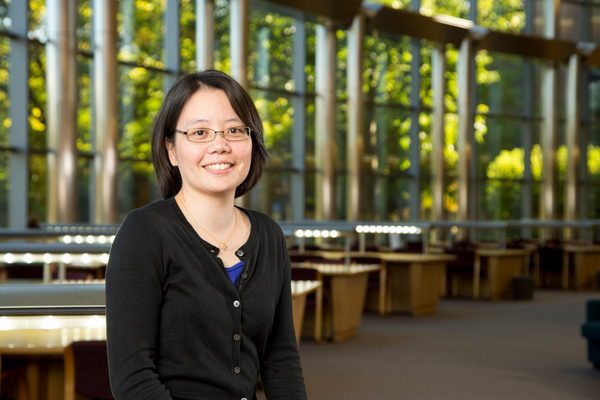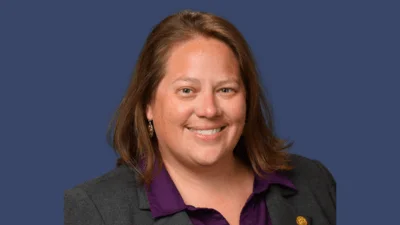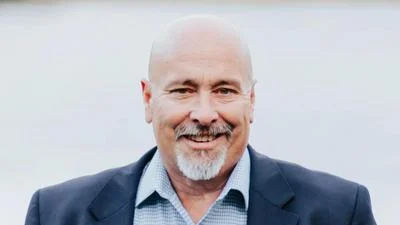Kazuko Hiramatsu is a connector. She is connecting her students with a broad understanding of how they fit into the world. She is connecting professors, linguists and administrators with pathways to more mindful teaching practices. And she is also trying to connect all of us to the understanding of how we make and share meaning in the world.
Hiramatsu, an associate professor of linguistics, began her academic career researching children's understanding of questions. Since then, her focus has shifted to the scholarship of teaching and learning. "It started with informal conversations between instructors in the English department," she said. "We would compare notes on what we were doing that was working."
This gives her a wonderful chance to pair two of her favorite things: research and thoughtful teaching.
She uses examples from her research in her classes to remove biases and deepen students' understanding of language. "The big issues that I want students who take linguistics courses to walk away with are not the phonetic alphabet or whether they can identify a subordinate clause, though that's helpful too," Hiramatsu said. " I want to instill a curiosity about language and to understand that there's prejudice around language and linguistic varieties and to understand how that works."
Hiramatsu also includes practices of integrative learning and metacognitive practice in her teaching as well. "Linguistics empowers students to feel comfortable, to be proud of the dialects that they speak, the languages that they know and kind of push back against the idea that there's a 'proper way' to use language," she said. "I want students to understand who's making those rules about 'what's good enough' so that they're able to push back on it when they need to."
She joined the Linguistic Society of America in 1995 and has continually made an impact at the national level, including her quest to improve student learning through the creation of a new branch of the LSA. She has served as chair of the Linguistics in Higher Education Committee and was the founding editor of the Scholarship of Teaching and Learning journal, "Teaching Linguistics," now a subsection of the LSA's "Language." She and longtime collaborator Michal Temkin-Martinez of Boise State University continue to serve as co-editors.
In 2019, Hiramatsu and Temkin-Martinez secured an NSF grant and created a nationwide Faculty Learning Community focused on SoTL. Twelve linguists from across the country participated in the collaborative process and continued to meet virtually even after the grant period. They discussed various ways to present topics in linguistics in a more accessible manner and created opportunities for LSA members to engage in conversations about teaching.
Hiramatsu now also leads the Persistence and Mattering in Undergraduate Education Research Cluster supported by UM-Flint's Office of Research to "advance the scholarship of teaching and learning using quantitative and qualitative methods to better understand undergraduate student success and sense of belonging in the university community." Hiramatsu stated that one of the strengths of the UM-Flint campus is that it has committed educators who are interested and passionate about not just their disciplines but supporting students.
As PMUE chairperson, Hiramatsu continues to examine the ways college instructors can better impact undergraduate students' persistence. She served on a team examining how high-impact practices can equip students with the skills employers value as identified by the American Association of Colleges & Universities. Hiramatsu also serves on a Teagle grant-funded team implementing a set of general education pathways with the Certificate in Humanities Inquiry in the Liberal Arts & Sciences that includes an eportfolio connecting ideas across disciplines.
Another transformational moment for Hiramatsu was beginning to co-teach the First Year Experience course in 2017 with Todd Womack, adjunct lecturer in social work. These FYE classes partner with the Urban Renaissance Center in Flint's Civic Park neighborhood to help instill an understanding that community engagement is central to the UM-Flint experience. "It was wonderful to see students transforming their preconceived notions about Flint and the campus," Hiramatsu said.
"Even if you don't live here, because you're a part of the university, you are not tourists," said Womack. "You are a part of the Flint community.'"
Hiramatsu gets a deep sense of pride from the impact she's had on her students. "It's joyful and so rewarding when I make connections with students in class," she said. "It's delightful when I hear, a couple of years later, 'your class was so transformative.'"

Original source can be found here.


 Alerts Sign-up
Alerts Sign-up